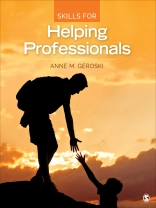Written specifically for non-clinical undergraduate students, but also relevant to graduate studies in helping professions,
Skills for Helping Professionals, by Anne M. Geroski focuses on helping students develop the skills they need to effectively initiate and maintain helping relationships. After exploring the literature identifying critical components of helping relationships and briefly reviewing developmental and helping theories, the text covers such topics as the helping process, self-awareness, and ethics in helping, and then focuses on specific helping skills such as listening and hearing, empathy, reflecting, paraphrasing, questioning, clarifying, exploring, and offering feedback, encouragement, and psycho-education. The final chapters focus on individuals in crisis and helping in groups.
Jadual kandungan
Chapter 1: Helping Processes
Helping Terms: Helping, Counseling, Psychotherapy, Therapy, & Advocacy
Helping Relationships
What we Know about Being Helpful
Chapter 2: Understanding Development: Theories, Social Context, and Neuroscience
The Purpose of a Theory
Theories of Development
Cultural and Social Factors in Development
Contributions from Neuroscience
Chapter 3: Helping Theories for Working with Others
Case Studies
Theories of Helping
Psychodynamic Approaches to Helping
Ethological Approaches to Helping
Humanistic Approaches to Helping
Behavioral and Learning Approaches to Helping
Contemporary Approaches to Helping
Chapter 4: Ethical Principles for Helping Relationships
Definitions
Ethics and Professional Practice
Moral Principles for Helpers
Key Ethical Concepts for Helping Professionals
Ethical Decision-Making
Chapter 5: Self-Awareness, Cultural Awareness, and Helper Competence
Helper Self-Awareness
Personalization Issues, Vicarious Trauma and Burnout
Emotional Self-Regulation
Assumptions, Values and Beliefs
Cultural Competence
Chapter 6: Setting the Stage for Helping
Getting Started
The Helping “Contract”
Assessment
Determining the Helpee’s Investment in Change
Goal Setting
Action Plans & Expectations
Helper Positioning
Chapter 7: Listening and Basic Responding Skills in Helping Conversations
Listening and Basic Responding Skills
Empathy
Reflections
Paraphrases
The Purpose of Reflections and Paraphrases
Questions
Broaching Conversations
Chapter 8: Skills for Promoting Change
Informing/Psycho-education
Decision-Making and Problem Solving
Confrontation
Feedback
Immediacy
Deconstructing Conversations
Motivating Change
Advocacy
Chapter 9: Helping People in Crisis
Natural or Human-Made Disasters or Crises
Crisis Response Strategies for Helpers
Harm to Self or Other
Harm to Self
Harm to Others
Chapter 10: Helping in Groups
Group Types
Basic Concepts in Group Work
Theories and Models of Group Work
Group Leader Principles
Intervention Skills and Group Stage
Mengenai Pengarang
Anne M. Geroski, Ed.D., is Associate Professor in the Counseling Program at the University of Vermont. In addition to professional journal publications, Dr. Geroski is the author of Sage publication, Skills for Helping Relationship Professionals, as well as Helping Skills for Counselors and Groups in Schools: Preparing, Leading, and Responding (co-author, currently in its second [in press] edition). She has been preparing counselors at the University of Vermont for over 20 years, with a special focus on skill development, work with youth, narrative practice, and a recent study of parenting intentions and practices. Dr. Geroski also has worked as a school and mental health counselor and consultant in a variety of settings in the U.S. and overseas. She currently lives with her partner, Kevin, in Burlington Vermont and they have four young adult children.









